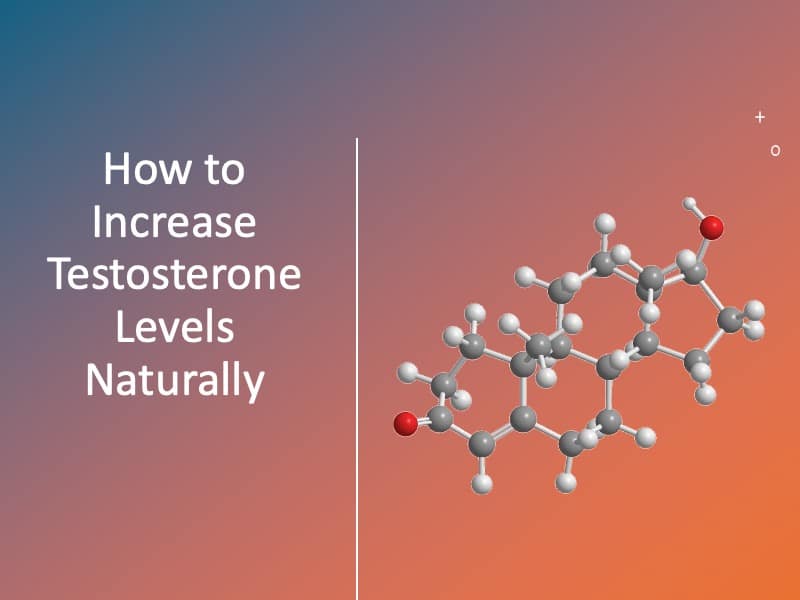How to Increase Testosterone Levels Naturally
Although most people have a vague understanding of testosterone, very few fully appreciate this hormone’s importance.
Testosterone is a vital hormone for both men and women.
Not only does testosterone play an important role in helping people build muscle, as most people commonly know, but it plays a crucial role in several aspects of general health for both men and women.
However, numerous men and women have problems with low testosterone. According to the Cleveland Clinic, almost 40% of men over the age of 45 have low testosterone, but this health issue also affects men and women of other age ranges.
Unfortunately, low testosterone is steadily growing in our modern era as people are less physically active and eat worse diets than ever before.
This article will describe some of the signs and symptoms of low testosterone that men and women should be aware of and a few healthy ways to increase testosterone levels naturally!
What is Testosterone?
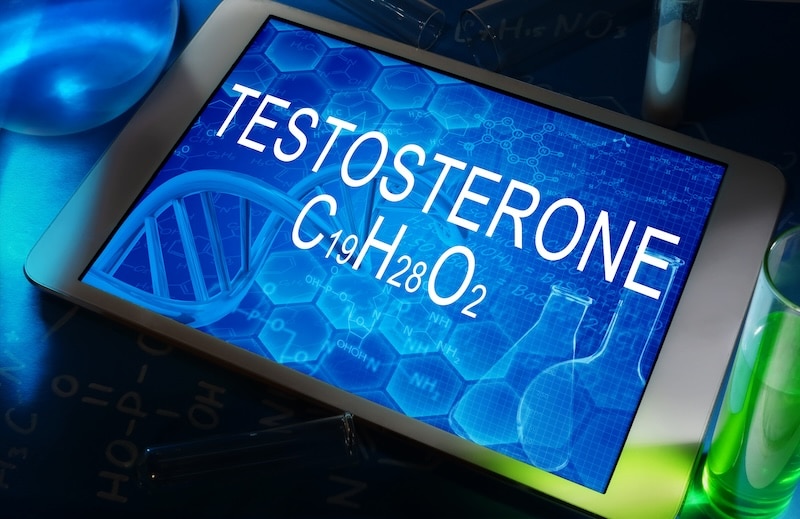
Testosterone is a steroid hormone that belongs to the androgen group and plays a central role in human health.
It is primarily produced in the testes in men and the ovaries and adrenal glands in women.
While it’s often labeled a “male hormone,” testosterone is essential for both men and women across numerous physiological functions.
Why Is Testosterone Important?
Testosterone is a foundational hormone that influences a wide range of physical, mental, and metabolic functions in both men and women.
Its impact extends far beyond reproductive health, playing a vital role in maintaining strength, vitality, and overall well-being throughout life.
Testosterone production is governed by the hypothalamic-pituitary-gonadal (HPG) axis, a hormonal feedback loop that carefully regulates levels based on the body’s needs.
Disruptions in this system—due to aging, lifestyle, or environmental toxins—can result in declining testosterone and the onset of related symptoms.
Across all individuals, testosterone plays a critical role in:
- Fat distribution
- Muscle mass and physical performance
- Red blood cell production
- Mood and motivation
- Bone density
- Fertility and reproductive capacity
Even small imbalances in testosterone levels can lead to fatigue, brain fog, low libido, poor recovery, and increased body fat—making hormonal health a key marker of overall wellness.
Testosterone levels have even been associated with mortality risk.
A study published in The Journal of Clinical Endocrinology & Metabolism found that men with low testosterone who received treatment had lower mortality rates than those who remained untreated, highlighting the hormone’s importance for long-term health and survival.
Testosterone levels typically peak in your early 20s and begin to gradually decline after age 30—usually by about 0.4% to 2% per year (McBride et al., 2016).
While this is a natural part of aging, many lifestyle factors can accelerate this decline, leading to symptoms that significantly affect quality of life.
Although older men are most prone to low testosterone, it can affect individuals of all ages, especially in today’s high-stress, low-activity environment.
Fortunately, many natural strategies exist to support testosterone production and help you maintain optimal levels as you age.
Recognizing the signs of low testosterone and learning how to address them early is essential for preserving strength, vitality, and long-term health.
In Men
Testosterone is responsible for the development of male reproductive organs and the appearance of secondary sexual characteristics, such as facial hair, a deeper voice, and increased muscle mass. It also supports:
- Libido and sexual function
- Muscle growth and strength
- Bone density
- Red blood cell production
- Metabolic health and body composition
In Women
Though produced in smaller amounts, testosterone remains essential for women’s health. It helps:
- Maintain hormonal balance and reproductive health
- Support muscle tone and bone strength
- Regulate mood and cognitive function
- Enhance energy levels and sexual desire
In women, testosterone also acts as a precursor to estrogen, contributing to a healthy hormonal cascade.
Causes of Low-Testosterone (Testosterone Deficiency)
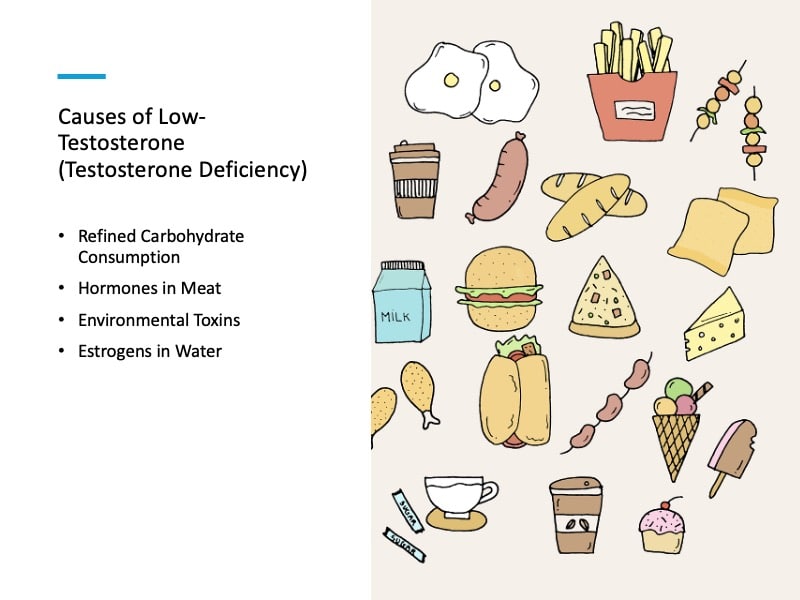
Many factors contribute to testosterone deficiency, including:
- Poor Eating Habits
- Smoking
- Lack of Physical Exercise
- Not Taking Proper Vitamins and Minerals
- Eating Processed Foods
- Drinking Sugar-Sweetened Beverages
Refined Carbohydrate Consumption
Much of the food consumed in a typical Western diet is processed carbohydrates. For example, having milk with a bowl of cereal
Elevated insulin is the initial cause of diabetes. It disturbs the main hormone pathway in the human body and later extinguishes testosterone production (Hut et al., 2018).
Hormones in Meat
In the United States, exogenous hormone treatment is used to assist the growth of animals raised for meat production.
However, these exogenous hormones can affect testosterone levels when consumed in higher amounts (Kolok et al., 2018).
You don’t necessarily need to avoid the consumption of meat because meat contains many beneficial vitamins, minerals, fats, and amino acids that assist testosterone production, but you should opt for grass-fed and hormone-free meat when possible.
Environmental Toxins
There are a variety of environmental toxins that can disrupt testosterone production (Krzastek et al., 2020).
Regular exposure to these endocrine-disrupting materials such as phthalates and BPA can cause a reduction in testosterone levels at all ages.
One of the best ways to avoid such circumstances is to switch to organic food and cosmetic products.
Of course, it is impossible to avoid all environmental toxins, but you can reduce your exposure as much as possible.
Estrogens in Water
There are a variety of pathways through that estrogen hormones can end up in water supplies, and this contamination of water supplies with estrogen can affect testosterone levels negatively (Gonsioroski et al., 2020).
Common Symptoms of Low Testosterone
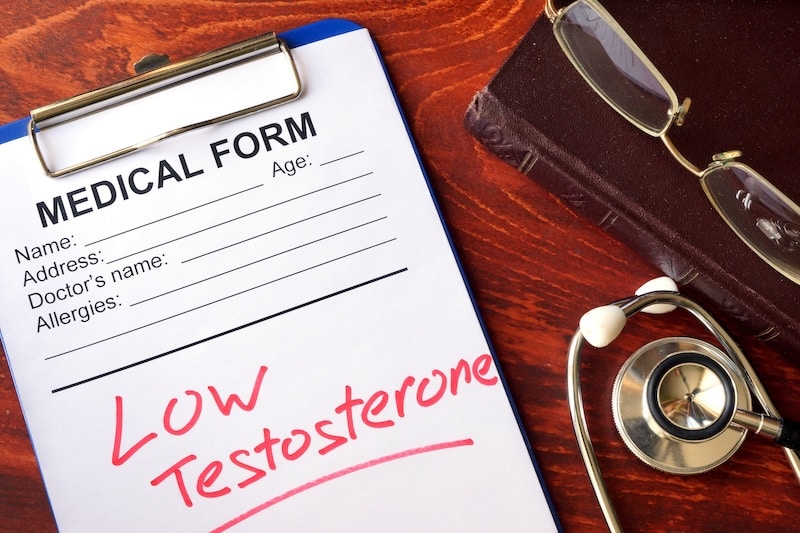
Testosterone deficiency or “low T” can manifest in various ways, from fatigue and low libido to mood swings and reduced muscle mass.
Symptoms often depend on age but can generally include:
- Low Energy and Persistent Fatigue
- Irritability and Depression
- Decreased Muscle Mass and Increased Body Fat
- Low Libido and Erectile Dysfunction
- Poor Sleep Quality and Concentration Difficulties
Low-testosterone is the root cause of many sexual health problems for men, and increasing testosterone is one of the simplest ways to regain confidence and control of that part of your life.
Older men and women are more prone to these symptoms, although low testosterone can impact adults of all ages.
How to Increase Testosterone Naturally
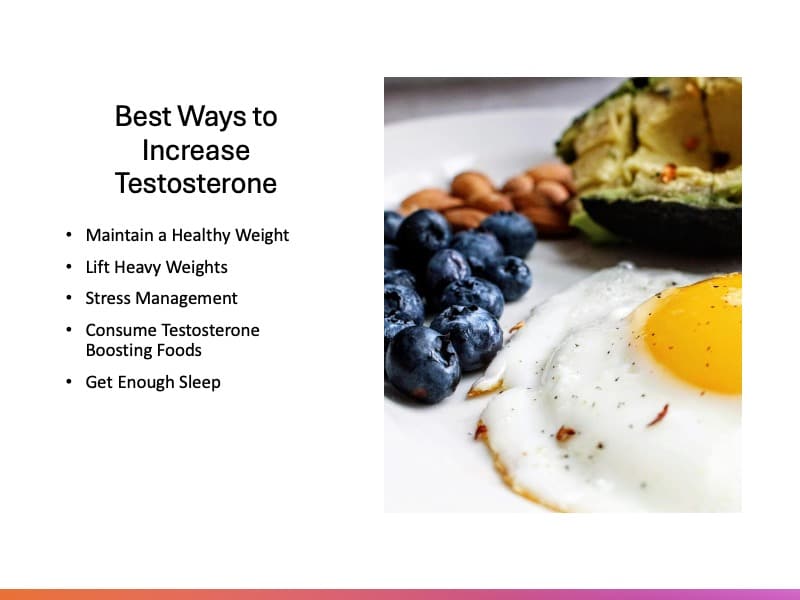
Regardless of whether you are a man or woman, it is important to have normal and stable testosterone levels. If you suffer from low testosterone, these tips can help you with increasing your testosterone levels naturally:
Maintain a Healthy Weight
If you are underweight, overweight, or obese, the first step you should take to increase your testosterone levels is to achieve and maintain a healthy weight.
Although being underweight can also contribute to testosterone issues, being overweight or obese is more common and affects more men and women.
Being overweight or obese is attributed to many health problems, and low testosterone is one of those issues because obesity leads to the overproduction of estrogen, which leads to reduced production of testosterone, thus causing a hormonal imbalance.
There are also other ways that maintaining a healthy weight will improve your testosterone levels. Maintaining a healthy weight likely requires the consumption of nutrient-dense testosterone-boosting foods and exercising, which will increase your testosterone.
Lift Heavy Weights
Resistance training, especially compound exercises like squats and deadlifts, boosts testosterone levels more effectively than other forms of exercise (Sports Medicine).
Weight lifting also supports muscle growth, which further promotes testosterone production.
Stress Management
Stress can contribute to various health issues, and it certainly can interfere with your ability to synthesize testosterone.
There are many natural remedies for stress which are effective for helping you learn how to reduce stress on your own.
Daily meditation, prayer, deep breathing, contrast showers, self-massage therapy, and mobility workouts are excellent ways to reduce stress.
Consume Testosterone Boosting Foods
Certain foods can naturally enhance testosterone production:
- Oats and Whole Grains: Complex carbohydrates like oats and whole grains provide essential nutrients and help reduce cortisol, aiding in stress management.
- Healthy Dietary Fats: Avocado, nuts, olive oil, and fatty fish support hormone synthesis.
- Eggs: Rich in protein, Vitamin D, and healthy fats, eggs are very beneficial for testosterone levels.
Get Enough Sleep
Getting enough sleep is vital for maintaining a healthy testosterone level, and many studies have shown that sleep increases or stabilizes testosterone.
Sufficient and quality sleep is critical for testosterone production. Studies indicate that testosterone levels naturally increase during sleep, with even minor sleep restrictions reducing testosterone significantly.
Taking a melatonin supplement and zinc before bed can help to improve your sleep quality and testosterone levels.
Drink More Green Tea
Increasing testosterone levels is one of the primary health benefits of green tea for men, although there are numerous reasons men should drink green tea for their overall health.
When looking for how to increase testosterone levels naturally, green tea might not be the first thing that comes to mind—but its impact on hormone balance makes it a powerful addition to a testosterone-friendly lifestyle.
One of the primary ways green tea supports testosterone production is by lowering cortisol, the stress hormone that can suppress testosterone levels when chronically elevated.
Thanks to its L-theanine content, green tea promotes relaxation and helps regulate stress, creating a more favorable environment for optimal hormone production.
Additionally, the catechins in green tea—particularly epigallocatechin gallate (EGCG)—act as potent antioxidants that help reduce oxidative stress, a key factor in hormonal imbalance.
By protecting cells from damage, green tea supports the body’s ability to maintain and regulate testosterone levels effectively.
Another overlooked benefit is green tea’s role in circulation and blood flow, both essential for male health and vitality.
Improved blood flow enhances nutrient delivery to muscles, aiding recovery and growth, while also supporting erectile function.
Research suggests that men who consume green tea regularly may experience improved vascular health, which is critical for maintaining healthy testosterone levels and overall well-being (Neves et al., 2008).
Incorporating green tea into your daily routine, alongside a diet rich in healthy fats, strength training, and adequate sleep, can be a simple yet effective strategy for those looking to increase testosterone levels naturally.
TRT: A Convenient Solution
Testosterone Replacement Therapy (TRT) has become more accessible through online platforms, providing a simple way for men suffering from low testosterone to access TRT treatments.
Getting TRT online provides an efficient and discreet means of connecting with healthcare professionals, undergoing assessments, and receiving treatment plans.
Numerous platforms now provide at-home testing kits to accurately diagnose testosterone levels without needing traditional clinic visits. This modern approach empowers individuals to take control of their own health while still remaining flexible and private.
For those experiencing symptoms of low testosterone, exploring TRT online could be the first step toward improving well-being while including natural remedies as well
This website does not provide medical advice. This website site does contain affiliate links, and purchases may earn a commission.
Read my Medical Disclaimer, Review Disclaimer, and Publishing Policies for more details. Use of this site indicates acceptance of these terms.

